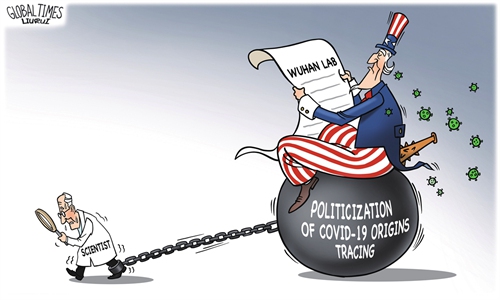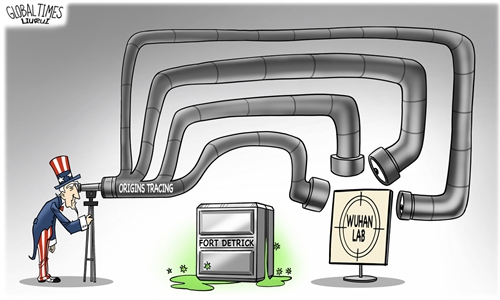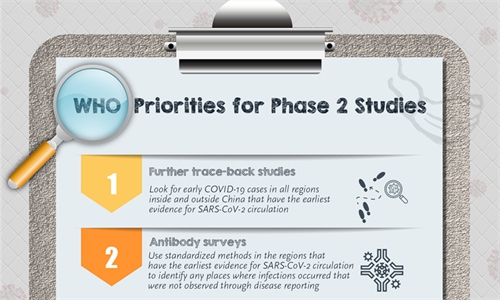WHO-China scientists warn of missing key studies window
US intelligence report widely deemed ‘a failure’, stifling tracing efforts
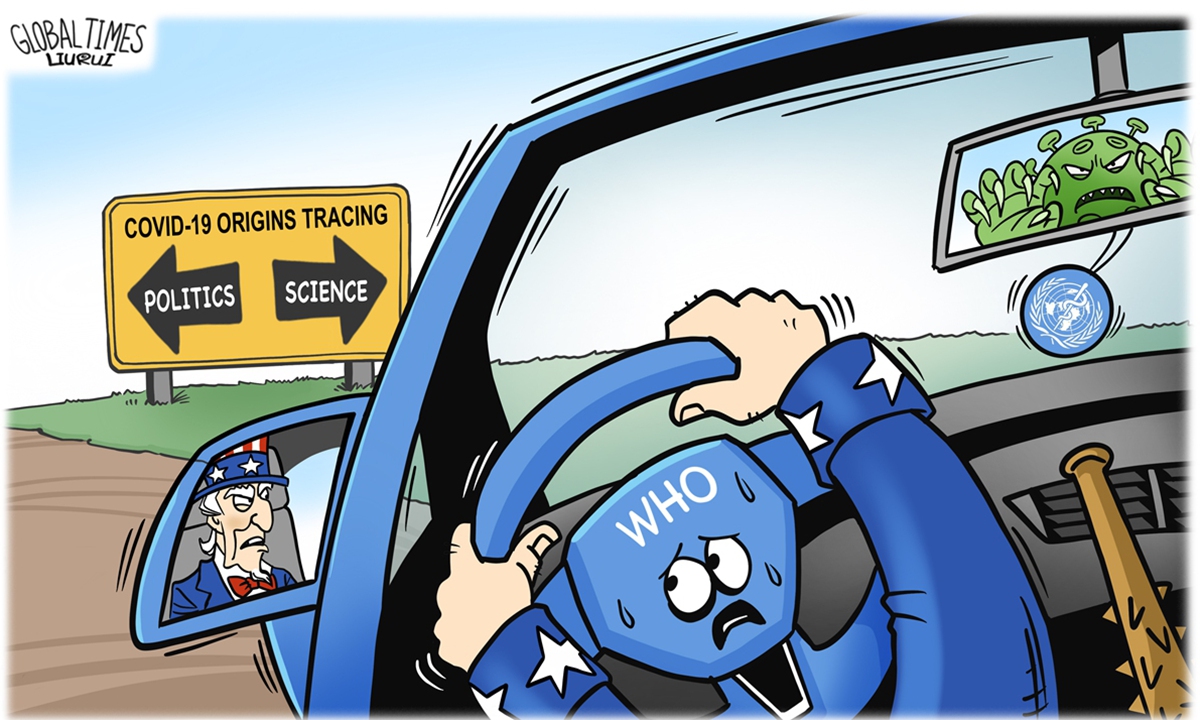
Illustration: Liu Rui/Global Times
The US has failed at COVID-19 origins tracing and its intelligence report on the virus origins was a failed set-up and buck-passing report, although the full report has not been released yet, insiders said, after US media reports said the report was "inconclusive" in determining the cause of the pandemic.
Some international scientists who believe the critical window for key scientific study on the coronavirus origins is closing, stressed that the US' intelligence report having no new evidence has been expected by most scientists around the world, as its report was not conducted based on science and not in cooperation with China and other countries.
The Global Times learned from sources that the report tried to smear China as the culprit of the pandemic using second-hand and unreliable evidence to prove the "lab leak" theory, a hypothesis even US scientific institutions and allies find far-fetched, and to achieve its political purpose, the US also sought to clamp down on scientists and the WHO, rope in its allies, and coerce China's neighbors to join in its smear campaign against China.
At Wednesday's media briefing, Chinese Foreign Ministry spokesperson Wang Wenbin said that US' virus tracing report compiled by its intelligence agencies was not for the truth of the virus origins, but to shift blame to China for its own mishandling of COVID-19 pandemic, and "such a set-up and political report cannot, of course, draw any scientific conclusions," Wang said.
He said that US officials' claim that there's a lack of information from China, was just an excuse to cover up the US' failure in virus tracing using intelligence.
Wang's remarks were made after US media reports cited US officials as saying that the intelligence report didn't yield a definitive conclusion on whether the coronavirus jumped to humans naturally, or via a lab leak, in part because of the "lack of detailed information from China."
A scientist with deep knowledge of COVID-19 origins tracing told the Global Times on Wednesday on condition of anonymity that the lack of new evidence from US intelligence analysts is what most scientists around the world expected, as tracing the origins of emerging diseases is difficult work that requires deep scientific understanding, experience working in the field and a close collaboration with the country that experienced the first known cases.
"The sooner we remove the political interference, and get back to allowing our scientists to work collaboratively with China, the sooner we'll find out exactly how this virus emerged," the scientist said.
Responding to the scientist's comments, Wang said at Thursday's media briefing that US' use of intelligence agencies instead of scientists will only disrupt the scientific origins tracing and obstruct international community's efforts to find the source of the virus at an early date.
"Why did the US still do this when it knew it was impossible? What is the real intention of the US to use intelligence agencies for tracing virus origins? It's worth thinking about," Wang said.
Marion Koopmans, head of the viroscience department at the Erasmus MC Rotterdam in the Netherlands and a member of World Health Organization (WHO)-China joint study on virus origins, told the Global Times that she does not expect that US' report to provide conclusive answers without additional studies that need to be conducted in China and elsewhere.
In May, US President Joe Biden announced a jaw-dropping decision, demanding US intelligence officers look into the origins of the coronavirus, and he gave the task a deadline of 90 days.
Since the US kept insisting that the lab leak hypothesis should not be ruled out despite waves of scientists globally reiterating their natural origins stances, China on Tuesday for the first time officially demanded the WHO investigate Fort Detrick lab and the University of North Carolina through diplomatic channels, as Chen Xu, Permanent Representative of China to the UN Office at Geneva and other International Organizations in Switzerland, on Tuesday sent a letter to Tedros Adhanom Ghebreyesus, the Director-General of the WHO, asking the WHO to conduct an investigation in the two US places for the next round of virus origins investigation in the spirit of fairness and justice. The letter is attached to a petition signed by more than 25 million Chinese netizens sent to the WHO demanding an investigation into the Fort Detrick lab.
After Chen submitted the letter, Fu Cong, director general of the Department of Arms Control and Disarmament of China's Ministry of Foreign Affairs, sorted out several mysteries that the international community is concerned about the two labs at a Wednesday media briefing, and once again urged the US not to politicize the issue.
Scapegoating China cannot whitewash the United States, Fu said.
The window is closing
As the US has been exhausting all means to lure and coerce some scientists to serve its political agenda to suppress China by hyping unfounded topics like "China refuses to join the virus origins tracing work," most scientists are dissatisfied with and oppose the US in politicizing the issue, the Global Times learned from a source.
In a rare move, the international scientists of WHO's SARS-CoV-2 origins tracing mission to China on Wednesday warned that the window for key scientific study is closing due to months-long stalled follow-up work since WHO's March report, stressing the urgency for scientific collaborative study while removing political interference which has focused on the lab leak theory, tried to discredit scientists and drive a wedge among them.
In the most recent paper published in Nature, 11 international scientists including Dutch virologist Koopmans and EcoHealth Alliance president Peter Daszak who undertook a 28-day mission to Wuhan, Central China's Hubei Province in January on the global study of virus origins and completed a WHO report in March, said the March report was "meant to be the first step" in a process that has stalled. It warned the window of opportunity for conducting this crucial inquiry is closing fast, and any delay will render some of the studies biologically impossible. "Understanding the origins of a devastating pandemic is a global priority, grounded in science," the piece said.
Koopmans told the Global Times on Wednesday that the authors of the Nature paper wanted to draw attention to the long delay between the initial work and the start of follow-up studies. "We now are approaching September, and there is no indication of when follow-up work could start. We feel that is taking too long and wanted to express that concern," she said.
In explaining the urgency of the next stage origins tracing work, Koopmans mentioned some time-sensitive studies such as the serological studies to stored blood bank samples collected in the later months of 2019 to identify the earlier pockets of cases.
She said WHO scientists talked to Hubei's blood banks during their stay and agreed to keep the samples, but "we also recommended similar studies in other regions inside and outside of China with early evidence for cases using the same methods, and that has not been arranged and may become impossible," she said.
Another author of the paper who requested anonymity told the Global Times on Wednesday that as time goes by, samples will get misplaced or degraded, people's memories will fade and antibodies will wane, making tracing work harder.
Moreover, the origins tracing work is now closely connected with international relations. The anonymous author said the sooner we get closer to an answer on origins, the sooner international relations will begin to improve as the "focus on the lab leak theory may mean on-the-ground work gets held up by political arguments."
Ever since the scientists completed and released their report of the China mission in March, US-led Western countries have geared up political manipulation to smear China using the "lab leak" theory, which was deemed as extremely unlikely in the report, discredited the report and pressed international scientists to change their natural hypothesis views.
The anonymous author, also a team member of the WHO-China joint study team, said it's clear political messaging and interference have tried to undermine the report's findings, discredit scientists involved, and try to drive a wedge among them.
"We stand united as a team behind the work we did with our colleagues in China. We reaffirm our confidence in the results of our analyses on which pathways are most likely and which are not, and strongly believe in the importance of keeping this work as a scientific collaborative study, and removing political influences," he said.
Priorities for follow-up study
In the paper, the WHO scientist stated six priorities for follow-up studies to lead from the initial studies in China, highlighting critical trace-back of people and animals in regions inside and outside China that have the earliest evidence for circulation of the virus, and targeted surveys of possible reservoir or intermediate hosts. But it did not include the "lab leak" theory, a sharp contrast with the WHO's next-phase origins-tracing work proposal asking for "audits of laboratories in Wuhan" and Biden's 90-day intelligence report.
Koopmans said that the paper did not include "lab leak" hypothesis as initial work did not provide evidence for involvement of a laboratory, and in the paper, scientists said since the March report, "We have publicly called for any data supporting the lab leak hypothesis to be published and submitted to the WHO. None has, so far."
Chinese health officials and scientists have rejected repeatedly virus origins studies driven by "lab leak" hypothesis.
Liang Wannian, the team leader of the Chinese side of the WHO-convened joint expert team on origins tracing, told a media briefing this month that scientists reached the consensus of "extremely unlikely" after thorough study in Wuhan on the lab leak hypothesis, which should not be included in the next-phase study, considering the conclusions and evidence from the joint report.
In fact, the next-phase study should be carried out in multiple places worldwide covering countries such as where the Chinese horseshoe bat and pangolins reside, nations that lack sufficient testing, places with animal and human being data tested positive for SARS-CoV-2 and who supplied Wuhan Huanan market through cold-chain logistics, Liang said.
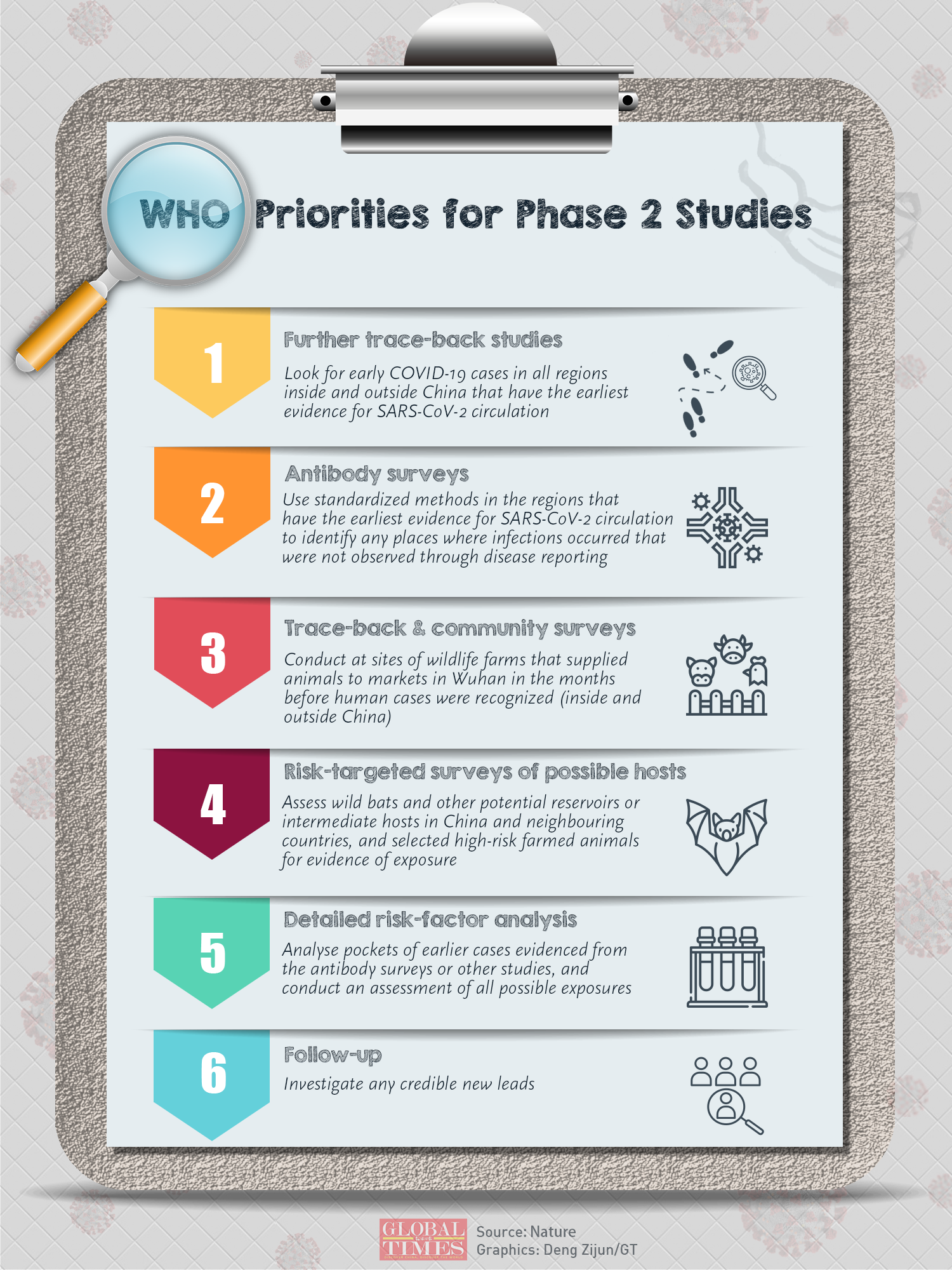
WHO priorities for phase 2 studies. Graphic: Deng Zijun/GT
